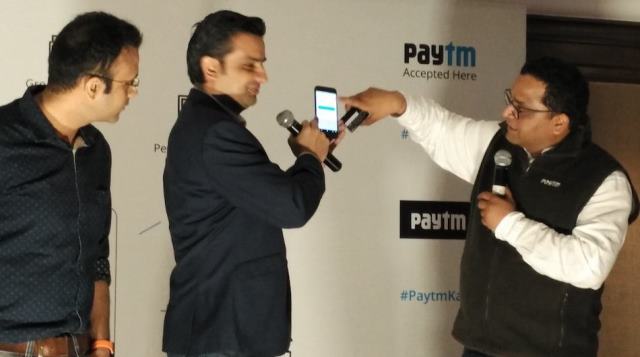
This is a huge gap in card payments which has become a sore point in India’s demonetization drive, with high denomination currency notes suddenly withdrawn and merchants not equipped to accept anything but cash. People were left at a loose end. Digital wallets mitigated it somewhat but obviously, its use is limited because it requires both the shopkeeper and the buyer to be users of the wallet.
This Pakistani startup offers solutions to differently-abled people
Today, Vijay Shekhar Sharma, founder and CEO of Paytm, launched a mobile POS to bridge this gap. All that the merchant has to do is install the Paytm app on the phone and use the option to accept card payments. This opens up a window to enter the debit or credit card details, just as a customer would do on a website that accepts card payments. The customer in this case does not need to be a Paytm user, they simply use their debit or credit cards to make the payment.
Vijay also pointed out that the card details entered cannot be accessed by the merchants and go straight to the bank’s gateway with the usual two-factor authentication for safety. Paytm has been working on this ever since Indian prime minister Narendra Modi made the shocking announcement to abolish currency notes of INR 500 (US$7.5) and INR 1,000 (US$15). Just yesterday, the Reserve Bank of India (RBI) – the country’s central bank – gave the approval for this to be rolled out.
What’s more, there is zero fee for transferring the money received to the merchant’s bank.
What the RBI has allowed is for any merchant to simply declare himself as a business entity and accept up to INR 50,000 (US$730) in a month through the Paytm app. This involves no know-your-customer (KYC) process. It is a DIY self-declaration. However, for those who have larger volumes of business, Paytm will follow up to get them registered with the usual KYC requirements. After that, there will be no limit in the amount of card payments merchants can accept through the Paytm app.
“This is the democratization of digital payments in the country. The country has 1.48 million card machines right now, by the end of this month, I expect that to become 15 million with the use of Paytm’s mobile POS,” Vijay said today.
What changes overnight

A physical POS machine costs INR 5,000 (US$73) upfront and a monthly rental of INR1,000 (US$15). This has been a huge deterrent for merchants adopting card payments. And most times, even if there are machines installed, connectivity issues play spoilsport and the value of transactions is too low, further discouraging merchants.
The mobile POS changes that overnight. Vijay pointed out that it will take a merchant just five minutes to download the Paytm app and do a self-declaration as a business.
What’s more, there is zero fee for transferring the money received to the merchant’s bank. Normal debit or credit card transactions through a POS machine attract 2-4 per cent charges. The service is free till December 31. After that Paytm expects to have its own payment bank and the zero-fee model will apply only if the money is deposited in the Paytm bank.
For merchants who choose to deposit in other banks, the usual 2-4 per cent charges will apply after December 31.
According to an RBI report released in March, transactions at POS terminals account for only 12 per cent of volume and 6 per cent of value of card transactions. India’s average number of card transactions per citizen stands at 6.7, which is among the lowest in the world.
5 reports every early startup must generate to stay alive
In less than a week after India’s demonetization move, Paytm’s payment network touched a record 5 million transactions a day. It saw a 1,000 percent growth in money added to the Paytm account and was on its way to processing US$3.5 billion in payments and money transfers.
China’s Alibaba Group and affiliate Ant Financial are the largest shareholders of Paytm’s parent company, One97 Communications, within an investment of US$680 million. Reports say Alibaba has directly acquired a 20 per cent stake and Ant Financial holds a little over 20 per cent.
This article originally appeared on Tech in Asia.






1732347751-0/Express-Tribune-(1)1732347751-0-270x192.webp)


1732264554-0/Copy-of-Untitled-(68)1732264554-0-270x192.webp)







COMMENTS
Comments are moderated and generally will be posted if they are on-topic and not abusive.
For more information, please see our Comments FAQ